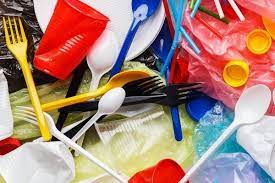The Environmental Protection Agency (EPA) is to engage authorities of the Kotoka International Airport (KIA) to control the influx of flexible and single-use plastics.
Dr Henry Kwabena Kokofu, Executive Director of the EPA, said the discussions would include the introduction of containers at certain points where passengers after disembarking would be required to deposit all flexible and single used plastics before going out of the airport.
The move, he said, would help minimise the influx of under 20 microns plastics, while other projects dealt with the in-country challenge.
Dr Kokofu was speaking at a brief ceremony to commence a week-long educational campaign on safe plastic disposable by the National Service Personnel of the EPA.
It is the group’s contribution toward a plastic pollution solution as part of the World Environment Day celebration.
This year’s celebration, which marks the 50th anniversary, is under the global theme, “Solutions to Plastic Pollution.”
The objective of the celebration is to create regular public awareness and education on emerging environmental issues.
It serves as a platform to amplify, and engage people, communities and governments around the world, and stimulate action on critical environmental challenges facing the planet.
He said, “Plastic solution has taken the form that if we do not stem the tides, globally and locally, we all stand extinct.”
Dr Kokofu advised the public to support the government’s efforts of minimising the plastic crisis by disposing them of in a safe way.
This will protect the environment, especially marine lives.
The government, in the past year, had been engaging stakeholders and would soon start rolling out its plastic policy, he said.
The producers of single-use plastics needed to find a way to collect the plastics and recycle them into other uses to benefit the economy.
Single-use plastics are primarily made from fossil fuel based chemicals and are meant to be disposed of right after use. They include wrappers, bottles, packaging products and straw.
“We need to support the efforts by segregating our waste, thus separating plastic waste, bottles, glasses, papers and the organics to facilitate recycling,” he said.


















